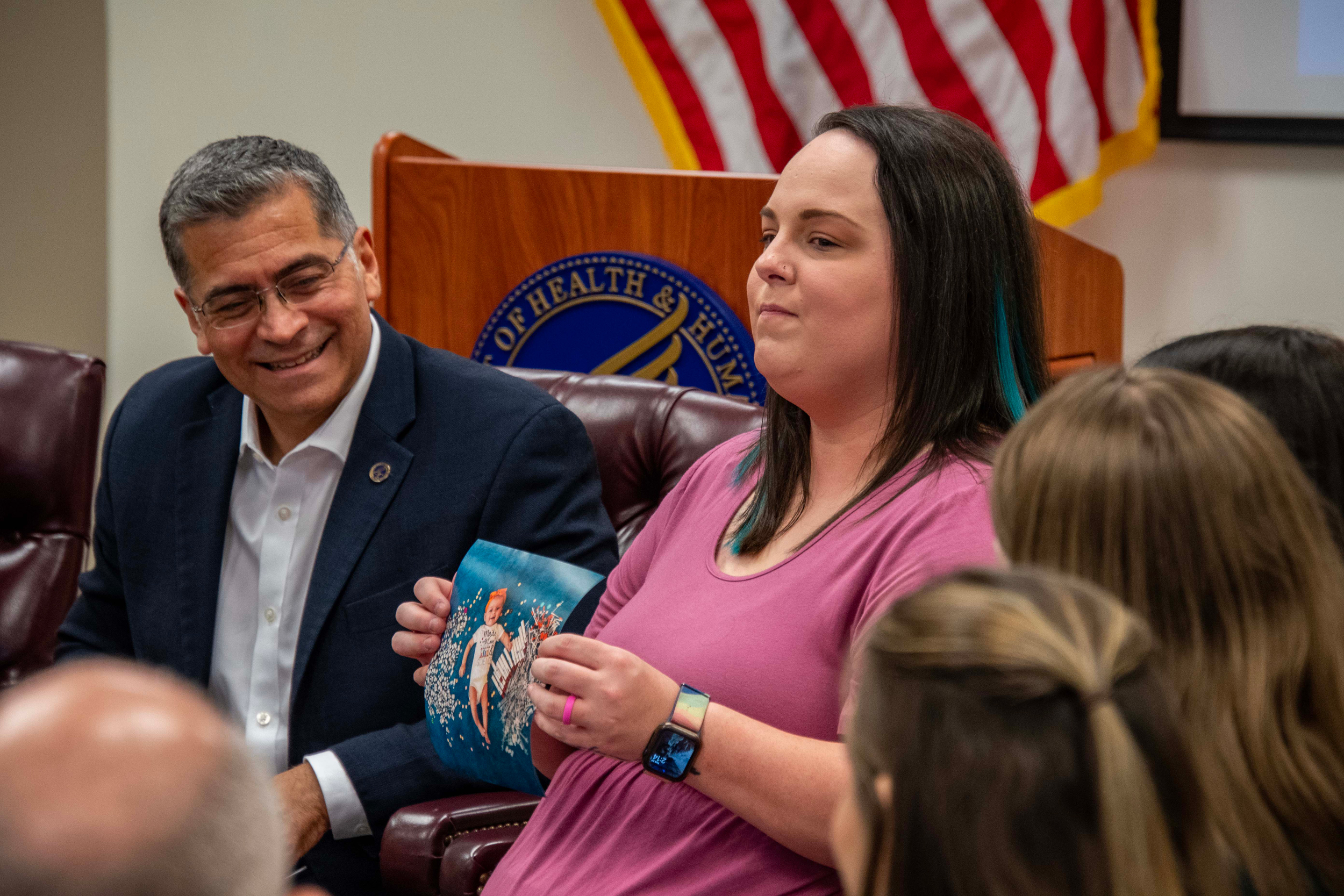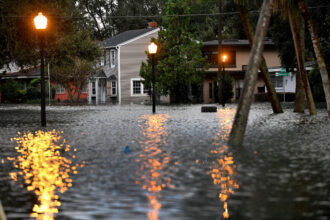BIRMINGHAM, Ala.—The politically explosive Alabama Supreme Court decision that found frozen embryos could be considered children has focused national attention on assisted-reproduction services that are needed in part because human exposure to chemicals makes it harder for people to have babies.
Toxic chemicals derived from fossil fuels and used in plastic and other forms of packaging, or in food processing, or in herbicides or pesticides are increasingly associated with a variety of health problems, including those involving human reproduction.
Researchers such as Shanna Swan, an environmental and reproductive epidemiologist, and her colleagues, have documented an alarming decline in male sperm counts and sperm health, attributing at least some of the cause to human exposure to chemicals that harmfully mimic hormones in our bodies. Research by others has raised concerns about how these ubiquitous chemicals are also affecting women’s reproductive capacity.
The situation has led Swan, author of the bombshell 2021 book, Count Down, which detailed how human fertility was being endangered on a vast scale, to conclude that assisted reproductive methods including in vitro fertilization are increasingly becoming vital for people struggling to conceive.
Yet the Alabama Supreme Court ruling prompted at least three medical providers in that state to pause offering in vitro fertilization services and has renewed concerns about the availability of assisted reproduction nationally as “personhood” laws spread across the country. The decision has also reopened a new front in the battle over women’s reproductive rights since the Supreme Court in 2022 overturned Roe v. Wade, which had guaranteed a constitutional right to an abortion for nearly 50 years.
“More and more people are turning to assisted reproduction to conceive a pregnancy, and this is only going to increase as the sperm counts go down, fertility rates go down and miscarriages go up,” said Swan, a professor of environmental medicine and public health at the Icahn School of Medicine at Mount Sinai in New York. “The decision of the Alabama Supreme Court is dangerous, and I would use that word advisedly, but for many reasons. One, it’s going to imperil the ability of couples to have children, which I consider a basic human right.”
Alabama Fertility Patients in Limbo
IVF treatments involve collecting mature eggs from a woman’s ovaries and fertilizing them in a lab with sperm. The fertilized eggs are called embryos, which are then placed in a uterus, where fetuses develop. Labs can freeze and store multiple embryos during the IVF process.
The Alabama case involved three families that sued over frozen embryos destroyed in an accident at a fertility clinic. The Republican justices concluded, citing legal and religious reasons, that the couples could pursue wrongful death lawsuits for what they described as “extrauterine children.”
The ruling sent shockwaves across the country, with many Democrats saying it’s ludicrous to consider a fertilized egg as a human being and promising to use the ruling against Republicans in upcoming elections this year. What is playing out in Alabama, they said, could have been expected amid the chaos in women’s reproductive health brought on by the Dobbs decision that overturned Roe v. Wade, and zealous, anti-abortion Republicans fighting to recognize life beginning at the point of conception.
Amid the backlash, many Republicans seemed caught off guard. For example, Alabama Sen. Tommy Tuberville told reporters he was “all for” the Feb. 16 Alabama Supreme Court decision, and in the same interview, added: “We need to have more kids.”
Meanwhile, people in the state who were counting on IVF treatments to help them have children remain in limbo, including Kendall Diebold, 32, who thought she’d been through it all.
There was her difficulty with fertility. Then there was the hip replacement, the result of a genetic disorder. After the surgery, she’d tried again to build her family. There was a pregnancy followed by an early miscarriage.
Diebold, a hematology nurse, said she thought that loss would be the worst thing she’d ever have to go through—until the Alabama Supreme Court blocked what Diebold sees as one of the only paths she has left to a biological child of her own.
On Feb. 27, Diebold and other fertility patients shared their experiences with Department of Health and Human Services (HHS) Secretary Xavier Becerra, who’d come to Birmingham to hear from women affected by the decision of the state’s highest court.
“We’re trying to figure out at a federal level what we could continue to do to try to be supportive of people who want to access their healthcare rights,” Becerra said.

After the event, Diebold told Inside Climate News that she doesn’t think any level of government—federal, state, or local—is doing enough to improve access to fertility care for those who need it. That includes studying factors like exposure to chemicals that may limit fertility, she said.
Her own diagnosis of unexplained infertility, for example, leaves Diebold with questions about how and why she’s found it difficult to have a child.
“We’re learning so much with medicine, and those advances are good, but there’s a lot that we don’t know, too,” she said.
Two weeks after the ruling, a legislative effort to address the abrupt halt of IVF services is getting closer to the desk of Gov. Kay Ivey, a Republican.
Both houses of the legislature have passed versions of a bill aimed at providing assurances to IVF clinics that stopped providing services in the wake of the high court’s ruling. Most clinics have not publicly said whether the law, if passed, will lead to a continuation of services.
In a state that bans abortion with no exceptions for rape or incest, some lawmakers, however, have also questioned whether the legislation will truly rectify the situation, given language in the Alabama Constitution that declares “it is the public policy of this state to recognize and support the sanctity of unborn life and the rights of unborn children.”
National abortion rights advocates worry about similar restrictions coming to other states. In all, four states currently have so-called “personhood” laws—Georgia, Alabama, Missouri, Arizona—according to the Center for Reproductive Rights. Thirteen other states have personhood laws pending in their legislatures, according to the group: Alaska, Colorado, Utah, Kansas, Oklahoma, Iowa, Missouri, Illinois, Indiana, Florida, Georgia, South Carolina, Massachusetts.
“Granting legal personhood to embryos could have disastrous consequences for the use of IVF, a science many people rely on to build their families,” said Elisabeth Smith, director of state policy at the Center for Reproductive Rights, in a written statement. “This is part of the chaos we knew would ensue if Roe v. Wade was overturned. With politicians at the helm instead of doctors, reproductive health care is in crisis.”
Studies Link Chemicals in Plastic to Fertility Woes
Across the country, medical doctors and researchers who study endocrine-disrupting chemicals and fertility expressed alarm at what’s playing out in Alabama, hoping it will somehow be reversed and won’t spread, while supporting the need for equitable access to fertility treatments, including IVF.
Much is at stake, as scientific understanding about risks to fertility grows; global fertility rates plummeted from more than five children per woman in the early 1960s to 2.3 in 2021.
There are many reasons to explain the global decline in fertility, including access to contraception and education of women. Many people are deciding to delay having families, and reproductive systems don’t work as well in older people.
But the scientific literature now is rife with studies raising alarms about how human exposure to chemicals may be negatively affecting both male and female reproductive systems, including from exposure to toxic chemicals that leach out of plastic.
Much of the concern lies with bisphenols and phthalates, two toxic chemical groups found in many plastics, meant to give them certain characteristics such as flexibility or rigidness. Some are also added to personal care products and cosmetics because they hold scent and color, or help with skin absorption.
Per- and polyfluoroalkyl substances (PFAS), a class of thousands of chemicals, are also known or suspected to be endocrine disruptors.

In 2018, the journal Integrated Medicine published a report that concluded that “the research is quite clear that metals and chemicals in air, water, food, and health-and-beauty aids are damaging fertility in many ways. These toxicants are causing men to experience relentlessly decreasing sperm count and function while women are suffering progressively worse anovulation (absence of ovulation), impaired implantation, and loss of fetal viability.”
In 2021, researchers published in the journal Reproductive BioMedicine Online reported that women in Turkey who were undergoing IVF treatment who drank bottled water had higher BPA levels than those who drank tap water, and their pregnancy outcomes were worse.
A study in 2022 in the Journal of Men’s Health concluded that microplastics may be a significant cause of male infertility.
And last year, researchers at the Department of Environmental Medicine and Public Health at the Icahn School of Medicine at Mount Sinai in New York found that exposure to chemicals commonly found in drinking water and everyday household products may result in reduced fertility in women of as much as 40 percent.
The team reported that higher blood concentrations of PFAS were associated with a significant reduction in the likelihood of pregnancy and live birth among a reproductive-age cohort of women in Singapore who were trying to conceive.
“We’ve been challenged with these environmental chemicals on a mass scale for about the last 40 or 50 years,” said Andrea C. Gore, a professor of pharmacology and toxicology at the University of Texas at Austin, and a board member of the Endocrine Society. “And that’s been exacerbated in the last 20 or 30 years.” These observations, she said, have coincided with the release of tens of thousands of chemicals into the marketplace.
Commercial production of plastics started in the 1950s and has climbed to more than 400 million metric tons in recent years. The Organization for Economic Co-operation and Development, a group that represents developed nations, has said plastics production could triple by 2060.
Late last month, the Endocrine Society, a group of doctors and other health professionals who are experts on hormone science, joined the International Pollutant Elimination Network (IPEN), a collection of 600 non-governmental organizations in 120 countries, in issuing a new report on endocrine disrupting chemicals and health.
The report noted increasing evidence that toxic substances were implicated in rising global health concerns, including problems with fertility. The report was released in Nairobi, where the U.N. Environment Assembly was meeting, and in advance of an anticipated update by the U.N. Environment Program and World Health Organization to their 2012 Report on State of the Science of Endocrine Disrupting Chemicals.
“It seems like most of the exposures are coming from things like food packaging and food processing,” or from exposure to pesticides on food or even sprayed in homes, Gore said.
Endocrine-disrupting chemicals have even been found in the fluid inside women’s uterine follicles, which encase developing eggs, Gore said.
“It really feels like the odds are stacked against you, when these chemicals are not just in the bodies of the people who are trying to have babies, but actually surrounding the follicles and potentially influencing how they develop and whether they’re going to be able to be fertilized,” she said.
Top Researcher Describes “a Crisis” of Low Sperm Counts
Swan, who is also a senior scientist at Environmental Health News, gets a lot of credit for bringing concerns about chemical exposure and fertility risks to light globally.
Research in the early 2000s had found that phthalate exposure during pregnancy was affecting the development of genitals in male rodents, a condition that was dubbed the “phthalate syndrome.” Swan then asked whether there could be a phthalate syndrome in humans. She found that higher phthalate concentration in the pregnant women’s urine predicted less masculinized genitals in baby boys, showing the phthalate syndrome in humans.
With colleagues in 2017, she found sperm counts in men in industrialized countries fell by more than 50 percent between 1973 and 2011, about 1.16 percent per year. A follow-up study with a wider geographic reach published in 2022 found sperm counts declining at an accelerated rate of 2.64 percent per year since 2000.
She considers the accelerating trend “a crisis,” though she added: “I’m not going to predict when we can no longer reproduce. I don’t think actually that that’s going to happen. I think technology is pretty good; excellent, in fact. We are very clever at getting ourselves out of jams. But you will see that it is becoming increasingly difficult to conceive a child.”
But some of that technology is now threatened by Republican politics, fueled by a particular brand of conservative religious views.
For example, the U.S. Conference of Catholic Bishops describes IVF as “immoral.”
The group, which represents bishops and archbishops across the country on national issues, acknowledges on its website that infertility is a growing problem, adding: “But the Bible tells us there are limits to acceptable methods for conceiving a child.”
This story is funded by readers like you.
Our nonprofit newsroom provides award-winning climate coverage free of charge and advertising. We rely on donations from readers like you to keep going. Please donate now to support our work.
Donate NowThe bishops’ conference did not return requests for comment.
In practice at fertility clinics, doctors recognize the risks from chemical exposures and recommend their patients avoid chemicals that may threaten their ability to reproduce.
“There is extensive data in the medical literature on the harmful impact of endocrine disrupters like BPA, phthalates, parabens, and many others on egg quality, sperm quality, time to pregnancy, IVF outcomes and risk of miscarriage,” said Dr. Lora Shahine, a reproductive endocrinologist and partner at the physician-owned fertility practice, Pacific NW Fertility in Seattle.
“We can’t eliminate exposure but we can decrease harm by making some realistic changes in our everyday life,” she said, suggesting not heating or storing food in plastic, washing fresh fruits and vegetables and opting for glass or stainless steel water bottles.
“Fertility is a field of study that shows harm in chemicals earlier than impact on adults like cancer or chronic illness,” she said. Decreasing exposure to endocrine disruptors is part of what she calls “lifestyle optimization.”
“It needs to be part of counseling like we recommend quitting smoking, limiting alcohol and more,” she said. “We can’t keep ignoring this.”













